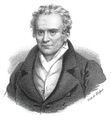Template:Selected anniversaries/July 28
1619: Astronomer Johannes Kepler writes to Napier expressing his enthusiasm for Napier's invention of logarithms.
1818: Mathematician and engineer Gaspard Monge dies. He invented descriptive geometry, and did pioneering work in differential geometry.
1899: Georg Cantor asked Richard Dedekind whether the set of all cardinal numbers is itself a set, because, if it is, it would have a cardinal number larger than any other cardinal.
1902: Philosopher and academic Karl Popper born. He will be known for his rejection of the classical inductivist views on the scientific method, in favor of empirical falsification: A theory in the empirical sciences can never be proven, but it can be falsified, meaning that it can and should be scrutinized by decisive experiments.
1904: Physicist and academic Pavel Cherenkov born. Cherenkov will share the 1958 Nobel Prize in physics in 1958 with Ilya Frank and Igor Tamm for their discovery (1934) of Cherenkov radiation.
1932: U.S. President Herbert Hoover orders the United States Army to forcibly evict the Bonus Army.
1968: Chemist and academic Otto Hahn dies. He pioneered the fields of radioactivity and radiochemistry, winning the Nobel Prize in Chemistry in 1944 for the discovery and the radiochemical proof of nuclear fission.
1974: Watergate scandal: The House of Representatives Judiciary Committee votes 27 to 11 to recommend the first article of impeachment (for obstruction of justice) against President Richard Nixon.








